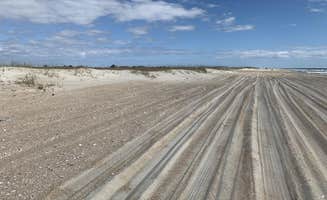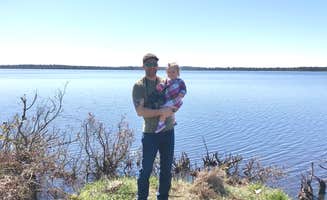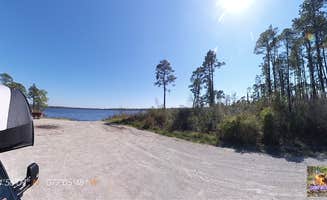Primitive camping sites near Atlantic Beach, North Carolina offer secluded wilderness experiences along coastal terrain with diverse ecosystems. Between the marine environments of Cape Lookout National Seashore and the wetland forests of Croatan, campers encounter various wildlife habitats with seasonal considerations. Local dispersed sites require specific equipment and preparation due to terrain conditions.
What to do
Explore marine ecosystems: Cape Lookout National Seashore provides opportunities for wildlife viewing beyond camping. "We took bikes and enjoyed cycling around at low tide. Be sure to camp above the high tide zone, which is black sand," notes Katie B. about South Core Banks Beach Camping.
Watch wild horses: The barrier islands host feral horse populations that visitors can observe. "We had three young male horses that were always roaming within sight. They even walked close by our campsite," reports Mike H. about his experience at South Core Banks.
Fish coastal waters: Fishing remains a primary activity for many visitors to the barrier islands. "No crowds, lots of open beach, and plenty of fish! If you're looking to camp on the beach and escape the crowds, you've found your spot," advises Jason D. from Great Lake Dispersed Site.
What campers like
Natural beauty: The unspoiled coastal environment draws many visitors. "The last night had the most amazing sunset that lit up the lighthouse and the clouds above with beautiful pinks, purple and blues," shares Mike H. about his camping experience at South Core Banks.
Isolation: The remote location provides genuine wilderness solitude. "See someone nearby, cool, whatever. Drive somewhere else and set camp," explains Vince Z. about the flexibility of Long Point Boat Launch camping areas.
Marine wildlife: Seasonal ecological events create unique experiences. "Show up late in April, early may and you will get to see the bioluminesent plankton wash up sound side, and a hike will leave glow in the dark foot frints," describes Avery M. about South Core Banks.
What you should know
Vehicle requirements: Off-road capabilities determine access to many sites. "You need 4WD to get around the island but most of the ferry places have atv rentals," explains Jason D. about beach camping logistics.
Environmental hazards: Wildlife encounters require preparation and awareness. "This is not a 'campground' per se, but rather a large area of national forest where dispersed camping is allowed. Watch out for snakes and alligators!" warns Virginia W. about Dixon Landing and surrounding areas.
Seasonal challenges: Weather patterns affect camping conditions throughout the year. "Waterspouts are extremely common here, so use sandbags with your tent and make sure the tent can handle heavy winds if the storms blow in over night," advises Avery M. about coastal camping.
Tips for camping with families
Bring all supplies: The remote nature requires thorough packing. "Just don't forget to pack it in, AND pack it out. While I'm at it, you should also prepare everything in advance - food, water, essentials. There ain't no corner market here," reminds Vince Z.
Insect protection: Coastal wetlands harbor significant insect populations. "The constant breeze on the beach side keeps the mosquitos at bay, and you will get eaten alive on the sound side," warns Avery M. about choosing campsite locations at coastal sites.
Educational opportunities: Seasonal conservation activities can involve younger campers. "Show up in October and you may get to help the rangers protect the sea turtles as they hatch," suggests Avery M. about timing your visit to Great Island Camp.
Tips from RVers
Access planning: Road conditions affect vehicle access significantly. "You can access Great lake with an Atv or SXS. There are passable trails past the barricades but you will need a capable 4x4 to get thru," advises S B. about conditions at Great Lake Dispersed Site.
Alternative parking: When designated access points are blocked, adaptable camping strategies help. "The path is blocked at about halfway down by concrete barriers and downed trees. So I pulled my Ford Ranger in the pines beside the path and slept there," shares Austin S. about improvising when encountering obstacles.
Ferry considerations: Vehicle transportation to barrier islands requires advance planning. "Only accessible by ferry/boat, call a few weeks ahead to reserve a spot on the ferry cause they fill up quickly," recommends Jason D. regarding logistics for accessing remote rustic camping near Atlantic Beach, North Carolina.





